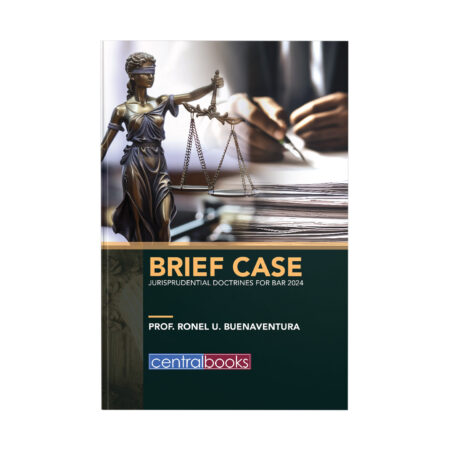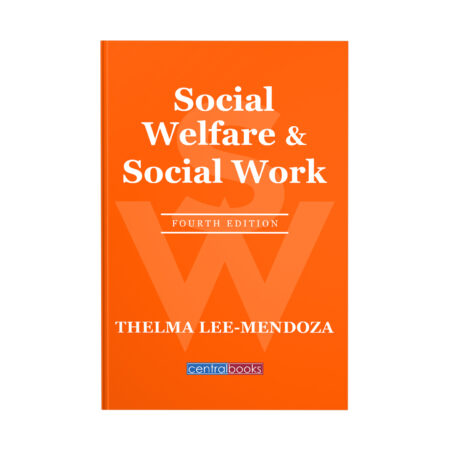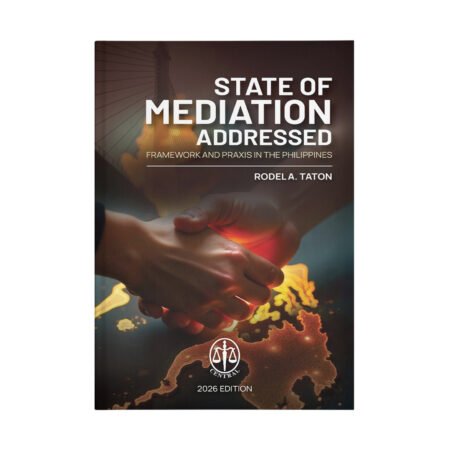
State of Mediation Addressed
₱820.00This work is born from a personal and professional experience. In 2008, my LLM Thesis, “Mediation in the Trial and Appellate Courts in the Philippines,” reminded of an attraction to this practice that has grown alongside the ADR movement in the country. To hone skills while writing, I joined Anabelle Abaya’s conflict resolution training and so much was learned from that experience.
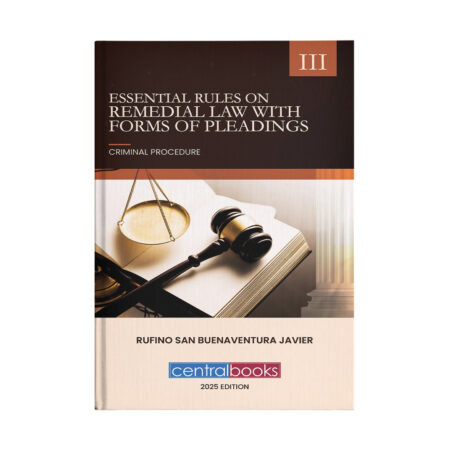
Essential Rules on Remedial Law with Forms of Pleadings (Volume III)
₱1,880.00Lawyers engaged to represent parties in court, more often than not, summon their core skill in writing their client’s case. Writing pleadings for some is a daunting area of practice. In fact, a busy legal advocate consults books on pleadings and practice. The precursor of this work, “Handbook on Pleading: Basic Rules and Forms” received kind acceptance by the members of the bar. It is being used as a worthy reference. These are the reasons that inspired the author to publish the book in three (3) volumes.
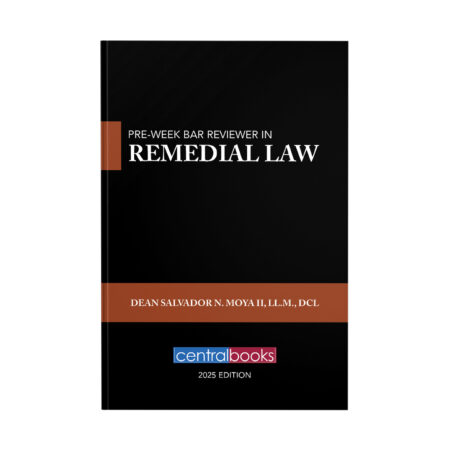
Pre-Week Bar Reviewer in Remedial Law
₱980.00As you enter the final stretch of your Bar journey, this Pre-Week Reviewer in Remedial Law is your companion to sharpen focus and strengthen determination. It is not for cramming, but for building confidence.
Trust in the preparation you have faithfully endured, trust yourself for the discipline and perseverance you have shown, and above all, trust in the Almighty God. Remember that success in the 2025 Bar Examination is measured not by knowledge, but also by courage and faith.
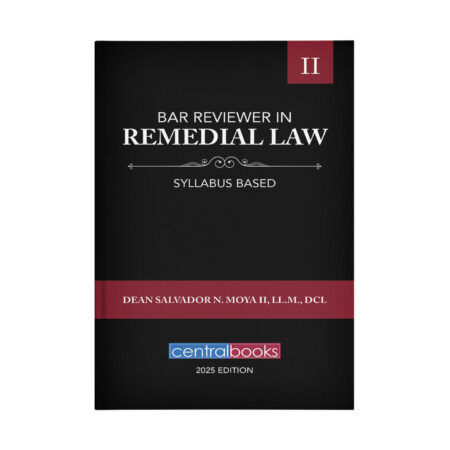
Bar Reviewer in Remedial Law (Syllabus-Based) Volume 2
Price range: ₱1,750.00 through ₱1,950.00This Bar Reviewer in Remedial Law: Syllabus-Based was crafted to serve as a focused and accessible companion for every Bar examinee tackling the complex field of Remedial Law. Anchored directly on the Supreme Court prescribed Bar syllabus, this reviewer streamlines essential doctrines, procedural rules, and jurisprudential highlights into a structured format. Recognizing the vast scope of Remedial Law, this book aims not to overwhelm, but to clarify. Each section is arranged according to the sequence of topics in the syllabus, allowing for efficient study in preparation for the Bar Examinations. It is our hope that this reviewer aids you not only in passing the Bar but in gaining a deeper, more confident grasp of Remedial Law as applied in practice.

Bar Reviewer in Remedial Law (Syllabus-Based) Volume 1
Price range: ₱1,750.00 through ₱1,950.00This Bar Reviewer in Remedial Law: Syllabus-Based was crafted to serve as a focused and accessible companion for every Bar examinee tackling the complex field of Remedial Law. Anchored directly on the Supreme Court prescribed Bar syllabus, this reviewer streamlines essential doctrines, procedural rules, and jurisprudential highlights into a structured format. Recognizing the vast scope of Remedial Law, this book aims not to overwhelm, but to clarify. Each section is arranged according to the sequence of topics in the syllabus, allowing for efficient study in preparation for the Bar Examinations. It is our hope that this reviewer aids you not only in passing the Bar but in gaining a deeper, more confident grasp of Remedial Law as applied in practice.

Pre-Week Reviewer in Remedial Law
₱980.00The Pre-Week Reviewer in Remedial Law is an essential resource for law students gearing up for their examinations. Authored by the esteemed Judge Janice L. Andrade-Udarbe, this comprehensive book offers an organized approach to understanding the complex subject of remedial law. Whether you are reviewing individual topics or preparing for a broader examination, this guide is tailored to meet your academic needs.
Judge Andrade-Udarbe has meticulously compiled critical concepts, case summaries, and practical examples within this review. The content is structured in a manner that promotes effective learning and retention of essential topics in remedial law. Each chapter includes rich explanations and key highlights that facilitate a deeper understanding of how remedial law operates in real-world scenarios. This book is designed not just for rote memorization but also for empowering students to apply their knowledge confidently in actual legal contexts.

Provisional Remedies Special Civil Actions and Other Writs
₱1,680.00This book, titled “Provisional Remedies, Special Civil Actions, and Other Writs”, continues to use the question-and-answer format adopted in the 2007 and 2019 editions. It includes annotations and updates in jurisprudence. In addition, it tackles the different writs aside from those already included in the Rules discussed. The author believes this format enhances understanding, appreciation, and retention of various provisions and details while maintaining substance and comprehensiveness. It is hoped that this work will be helpful to the members of the judiciary, lawyers, law students, and the Bar reviewees.

Remedial Law Reviewer Vol. 2
₱1,380.00Prepare to enhance your understanding of legal principles with the Remedial Law Reviewer 2 by Judge Janice L. Andrade-Udarbe. This essential resource is meticulously designed for students, practitioners, and legal professionals alike, ensuring that you are well-equipped to excel in your studies and legal practice. The book provides a thorough exploration of Evidence and Special Proceedings presented in a Q&A format, making complex topics accessible and engaging.
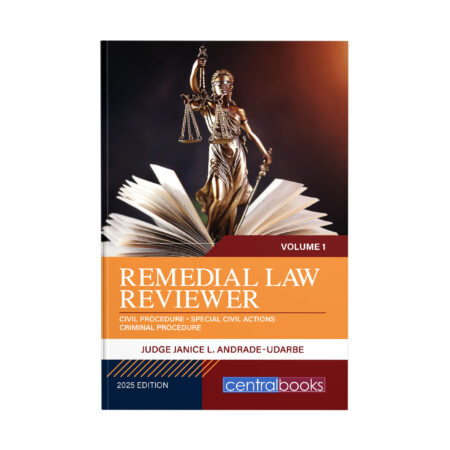
Remedial Law Reviewer Vol. 1
₱1,140.00Are you ready to enhance your knowledge and confidence in Remedial Law? Look no further than the Remedial Law Reviewer 1 by Judge Janice L. Andrade-Udarbe. This comprehensive Q and A guide is meticulously designed to tackle the complexities of Civil Procedure, Special Civil Actions, and Criminal Procedure. Whether you’re a student preparing for exams or a professional looking to refresh your knowledge, this reviewer is an invaluable resource.
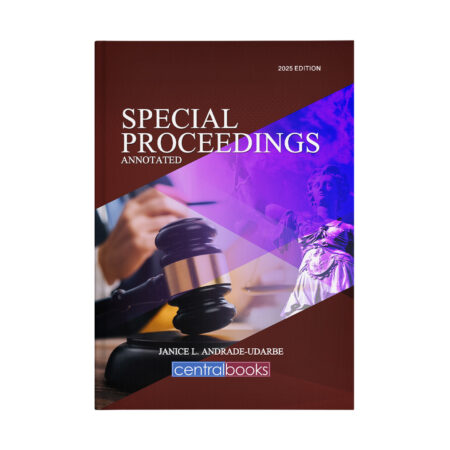
Special Proceedings Annotated
₱1,460.00A mile wide and an inch deep this book on Special Proceedings, Annotated is most definitely not. Coming as the latest offering of the author’s Remedial Law Series, this opus not only covers a wide latitude of the subject matter but also provides much needed depth that will appeal to and provide much use for its readers. Navigators will find treading on its waters a delight as each page presents rules and explanations and illustrations in a clear, systematic, and purposeful manner.

Special Proceedings
₱1,550.00The book starts with a discussion on the settlement of estate before descending further on the topics of correction of entries in the Civil Registry, the Rules involving Habeas Corpus, Habeas Data and Writ of Amparo, the Rules on Environment proceedings, the New Rules on Adoption (R.A. No. 11642). Jurisprudence until the year 2022 has also been included in order to ensure that the reader is updated with the latest jurisprudence.

Remedial Law Reviewer (Volume 2)
₱1,750.00Coming up with this iteration of the Remedial Law Reviewer was brought about by the need to keep in step with recent jurisprudence up to June 2024 which have been included in the text herein in order to ensure that the reader keeps abreast with the latest developments as well as the 2025 syllabus of the Bar Exams in Remedial Law.
Eminently dedicated to the late Dean Ed Vincent S. Albano, it is humbly hoped that the readers continue to learn lessons from this reference.

Remedial Law Reviewer (Volume 1)
₱1,750.00Coming up with this iteration of the Remedial Law Reviewer was brought about by the need to keep in step with recent jurisprudence up to June 2024 which have been included in the text herein in order to ensure that the reader keeps abreast with the latest developments as well as the 2025 syllabus of the Bar Exams in Remedial Law.
Eminently dedicated to the late Dean Ed Vincent S. Albano, it is humbly hoped that the readers continue to learn lessons from this reference.

The Amended Rules on Civil Procedure Annotated (Book 2)
₱1,680.00This book contains valuable discussion and annotations on the amendments to the 1997 Rules of Civil Procedure with the intention of empowering law students and providing valuable resource and guide for the Bench and the Bar in the application of the amended Rules by providing a brief but clear and concise discussion.
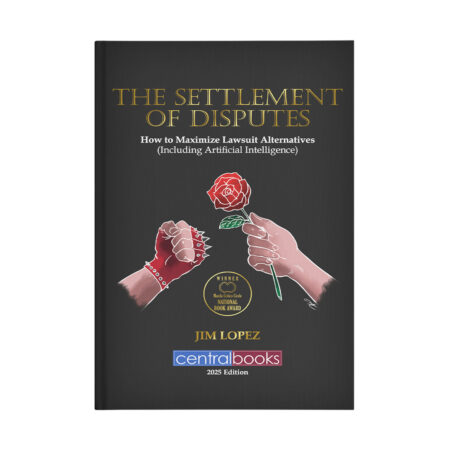
The Settlement of Disputes: How to Maximize Lawsuit Alternatives
₱1,350.00The entry of artificial intelligence in the area of dispute resolution has made its study even more interesting. No one should ever stop learning. There is an abundance of lawsuit alternatives (or litigation substitutes) that await those who are willing to continue their ongoing personal, familial and business relationships. It is the purpose of this book to guide the reader around the murky and often treacherous, waters of our judicial system. Rational and pragmatic approaches in dispute resolution are evaluated and synthesized to help litigants avoid the expense, misery, and madness in coursing a lawsuit through the public court system. This book incorporates various useful guidelines and instructions for law students, lawyers, corporate conflict managers, and litigants in coping with “the crisis of judicial overload.”

The Revised Rules on Evidence Annotated
₱1,250.00The Revised Rules on Evidence, authored by Judge Janice Andrade-Udarbe, provide critical insights and clarity for legal practitioners. These updated guidelines serve to streamline judicial processes and enhance the efficiency of legal proceedings.
Judge Andrade-Udarbe’s annotations offer detailed explanations of each rule, ensuring that legal professionals fully understand their applications. The revisions emphasize the importance of context and purpose in evaluating evidence, promoting a fairer judicial system.
These updated rules are essential for lawyers aiming to present compelling cases. Understanding the revised rules on evidence helps ensure compliance and upholds the integrity of the legal process. Familiarity with these guidelines allows practitioners to navigate the complexities of evidence more effectively.

The Revised Rules of Criminal Procedure Annotated
₱1,650.00The revised rules of criminal procedure annotated book by Judge Janice L. Andrade-Udarbe offers a comprehensive look at the evolution of criminal procedures. It serves as an essential resource for legal practitioners and students alike.
This authoritative text not only provides an extensive examination of revised rules but also includes insightful annotations by Judge Andrade-Udarbe, clarifying complex legal principles. The book stands out for its clear organization and practical examples.
In today’s fast-changing legal environment, having access to the revised rules of criminal procedure annotated is crucial.
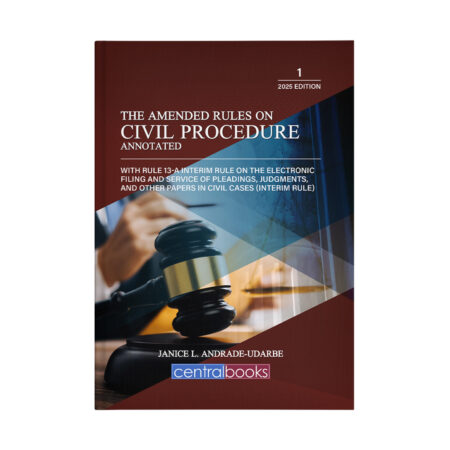
The Amended Rules on Civil Procedure Annotated (Book 1)
₱1,850.00This book contains valuable discussion and annotations on the amendments to the 1997 Rules of Civil Procedure with the intention of empowering law students and providing valuable resource and guide for the Bench and the Bar in the application of the amended Rules by providing a brief but clear and concise discussion. This book also contains the recent circulars issued by the Supreme Court as regards the E-filing rules.
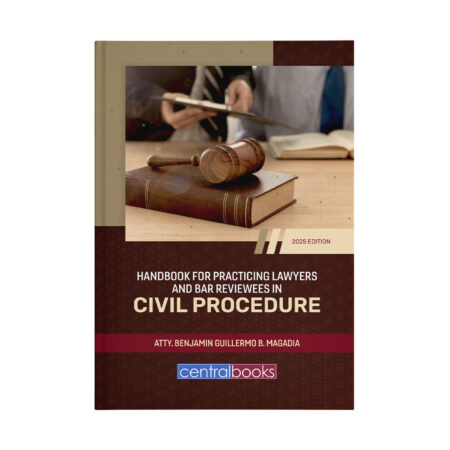
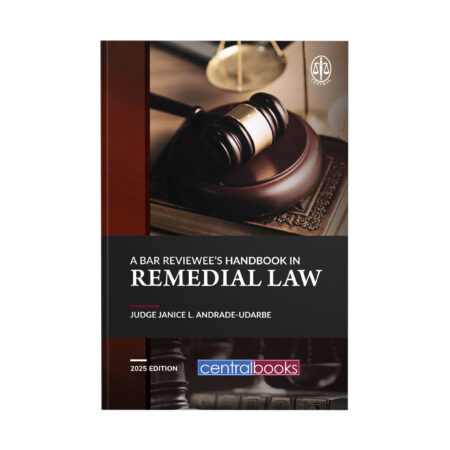
A Bar Reviewee’s Handbook in Remedial Law
₱980.00This book eases that anxiety. The coverage is comprehensive, the narrative, simple and uncomplicated. No stone is left unturned. But the shaft is removed from the grain. Only the substantial and essential. But no question in remedial law from both the bar and the bench can escape the reach and ambit of this treatise. Designed principally for bar reviewees, it is recommended as well to students and professors of law who will find in it a panoramic view of all the subject matter in remedial law. Likewise, trial lawyers may derive from this book the needed support in their practice by relying on the latest jurisprudence as footnoted for a particular topic. The Appendices constitute a unique feature in the book which include the cases penned by the 2025 Bar Chair (a most welcome development), as well as the Flowcharts which are novel in the Rules of Court.
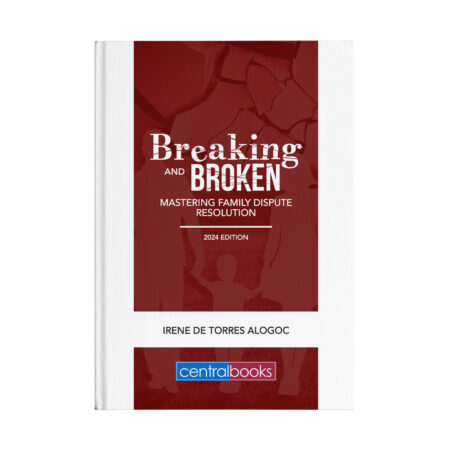
Breaking and Broken: Mastering Family Dispute Resolution
₱1,280.00This book, Breaking and Broken: Mastering Family Dispute Resolution, aims to shine a spotlight on the unique challenges and profound opportunities presented by the distinct legal, cultural, and societal frameworks that govern family conflicts in the Philippines. Whether you are a mediator, a legal professional, social worker, counselors, community leader or someone grappling with family conflicts, I hope this book provides you with the insights and strategies needed to navigate these challenging situations with grace and effectiveness.
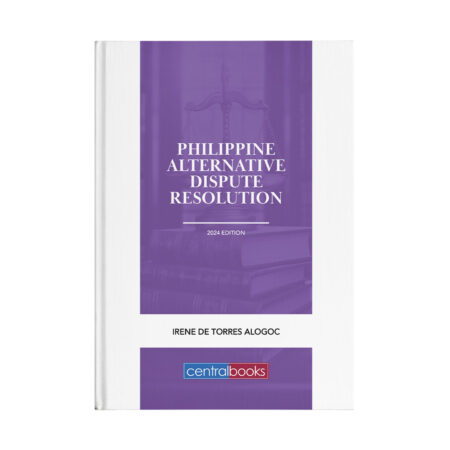
Philippine Alternative Dispute Resolution
₱2,980.00I yearn for this book to serve as a meaningful contribution to the body of existing knowledge on alternative dispute resolution (ADR) and, ultimately, toward the efficient administration of justice in the country.

Remedial Law Volume 1: The 1997 Rules of Civil Procedure
₱2,250.00This simple book is a product of the authors’ working knowledge in the field of Remedial Law and is intended to simplify the study of Civil Procedure and other related laws as a supplementary reading materials for the students of law, bar candidates, and bar practitioners. It is highly recommended, that while reading, the reader must take a glance first of the codal provisions of the Rules of Court.
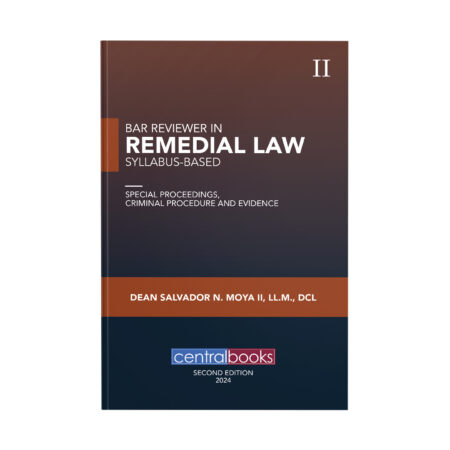
Bar Reviewer in Remedial Law (Syllabus-Based) Volume 2
Price range: ₱1,580.00 through ₱1,850.00The annual Bar Examination is fast approaching. Every year, Bar Candidates would try to acquire as many books as they want in order to make sure that they would leave no stone unturned. A Legal Luminary, in the person of Dean Salvador N. Moya II, had long prepared this book to ensure that the Outline for the 2024 Bar Questions in Remedial Law would be fully covered and discussed including the important principles and latest jurisprudence on the matter.
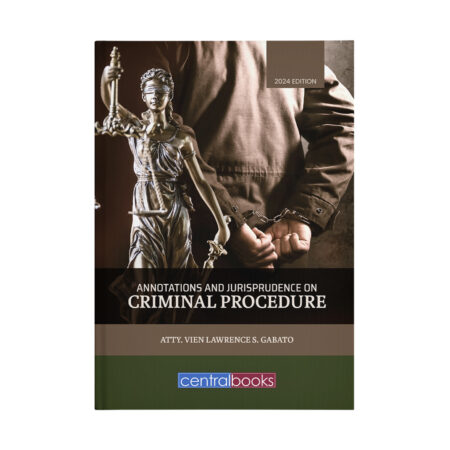
Annotations and Jurisprudence on Criminal Procedure
₱1,560.00Consequently and after writing my recent book on Evidence, I was emboldened to follow this up with Criminal Procedure. As I have been doing litigation since I was admitted to the Bar in 2010, plus the prior years where I worked as paralegal and researcher, I want to reduce some of my knowledge and experience in writing, for me to share my thoughts and views on practice and pleadings for the student of the law and legal practitioners.
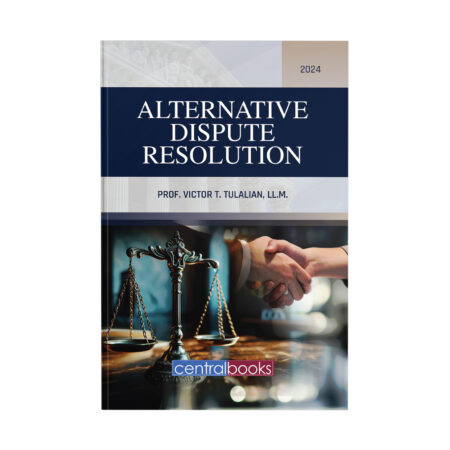
Alternative Dispute Resolution
₱850.00Alternative Dispute Resolution (ADR) refers to ―a range of ways that people can resolve disputes without resorting solely to court and tribunal hearings for determination. (The ADR system ―means any process or procedure used to resolve a dispute or controversy, other than by adjudication of a presiding judge of a court or an officer of a government agency, in which a neutral third party participates to assist in the resolution of issues, which includes arbitration, mediation, conciliation, early neutral evaluation, mini-trial, or any combination thereof.

Mastering Criminal Procedure: A Practical Approach to the Bench and Bar
₱1,500.00Criminal procedures are a sanctuary against the arbitrary application of criminal laws. It is directed to apply the constitutional rights of individuals, starting with the initial police intervention, arrest, investigation, trial, sentencing, and appeals.

Remedial Law: The Revised Rules on Evidence (Volume IV)
₱1,180.00The amended provisions of the Rules of Court are still included and retained for comparison purposes with the amendments.

Remedial Law: Revised Rules of Criminal Procedure (Volume III)
₱1,480.00This book gives emphasis on the basic structures of Criminal Procedure and the frequently asked provisions in the previous bar examinations from 1997 to 2023.

Remedial Law: Excerpts of the 2019 Amendments to the 1997 Rules of Civil Procedure
₱1,280.00This book gives emphasis on the basic structures of the 2019 Amendments to the 1997 Rules of Civil Procedure (A.M. No. 19-10-20-SC) and the frequently asked provisions in the previous bar examinations from 1997 to 2023.

Annotations and Case Law Dissections on Evidence
₱1,580.00Our “Annotations and Case Law Dissections on Evidence Book” is a comprehensive resource for legal professionals, researchers, and students seeking a deeper understanding of the law of evidence. This book provides detailed explanations and analysis of key cases and legal principles related to evidence.

Disquisition and Jurisprudence on Remedial Law (Volume 3)
₱1,980.00We have updated the Disquisition and Jurisprudence on Remedial Law Volume I (Civil Procedure), Volume II (Criminal Procedure) and Volume IV (Rules on Expedited Procedures in the First Level Courts and Special Proceedings). And, finally, volume III on the Rules on Evidence which is the subject of this edition. Certainly, this is of utmost importance because it is through the rules of evidence that litigants can prove the facts in issue before of our courts of law.

Outline in Remedial Law Volume I: Civil Procedure
₱1,640.00The 2019 Proposed Amendments to the 1997 Rules of Civil Procedure shall govern all cases filed after their effectivity on 1 May 2020 and also all pending proceedings, except to the extent that in the opinion of the court, their application would not be feasible or would work injustice, in which case the procedure under which the cases were filed shall govern. See A.M. No. 19-10-20-SC on Rule 144 — Effectiveness.

Outline in Remedial Law Volume II: Special Proceedings
₱1,320.00We believe that in order to attain a proper appreciation of procedural law — we need to familiarize ourselves with the core concepts of procedural law, the dynamics involved and more importantly — the reason and principle behind each procedure laid out under the Rules. This way, we eliminate our unfounded dependence on rote memorization and utilize instead our intellectual faculties to learn, to understand – even to question and critique – each and every provision that forms part of that intricate and interwoven phenomenon we call remedial law.

Outline in Remedial Law Volume III: Criminal Procedure
₱1,320.00His new Book on Criminal Procedure has again shown what a truly gifted writer can do in the treatment of a subject matter which every legal practitioner should know by heart. Not every writer on the subject is as qualified as he is on the subject. He was part of the Supreme Court Committee that crafted the 2000 Revised Rules on Criminal Procedure and continued to put to practice the rules as a practicing lawyer.

Appellate Advocacy: Appeal, Petition for Review and Appeal by Certiorari
₱2,180.00The appellate process in remedial law is, more often than not, glossed upon in law school. We often place more emphasis on the proceedings before the Regional Trial Courts considering that most, if not all, new lawyers at the start of their practice and even through the twilight of their career, would focus on the daily grind before regional trial courts.

Alternative Dispute Resolution
₱1,680.00This book include a chapter on ADR mechanisms in the judicial front, namely: the Court-Annexed Mediation (CAM), Judicial Dispute Resolution (JDR), Judicial Dispute Resolution on Appeal (JDRA), and Appellate Court Mediation (ACM), to provide readers with a comprehensive understanding of ADR processes in and out of the court trial system and the manner that they complement each other.

Notes and Cases in Remedial Law (Evidence) Vol. IV
₱2,050.00Per A.M. No. 19-08-15-SC effective May 1, 2020. It traced the origin of the new provisions and basis of the amendments from the Federal Rules of Evidence of the US. Each Rule and section/s are highlighted by the decisions of our SC, and in the absence thereof by the US-FSC decisions and the Notes from the US congress. Reliable text book for law students taking Evidence, Remedial Law Review and Reviewees preparing for the Bar. Useful to trial lawyers and the bench.

Notes and Cases in Remedial Law (Civil Procedure) Vol. I Part 4
₱2,050.00It covers the Rules 57 to 71 (Provisional Remedies and Special Civil Actions) with enlightening comments on each rule. Undoubtedly, it will serve as a useful and enlightening reference not only for the Bar Reviewees but for every practitioner of law.
This law book contains the latest jurisprudence, principles and commentaries that one can use in the pursuit and advancement of his career in the legal profession.

Notes and Cases in Remedial Law (Civil Procedure) Vol. I Part 3
₱1,850.00It covers Rules 40 to 56 of the 1997 Rules of Civil Procedure. Undoubtedly, it will serve as a useful and enlightening reference not only for law students and Bar Reviewees, but for every practitioner of law.
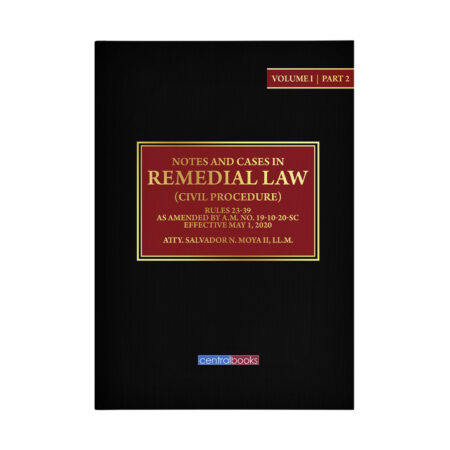
Notes and Cases in Remedial Law (Civil Procedure) Vol. I Part 2
₱2,050.00It covers the entire “Rules of Court” with enlightening comments on each rule. Undoubtedly, it will serve as a useful and enlightening reference not only for the Bar Reviewees but for every practitioner of law.

Notes and Cases in Remedial Law (Civil Procedure) Vol. I Part 1
₱2,050.00General Principles, Jurisdiction, Small Claims, Katarungang Pambarangay, Rules of Summary Procedure, and Rules 1-22 of the amended 1997 Rules of Civil Procedure per A.M. No. 19-10-20-SC.

Disquisition and Jurisprudence on Remedial Law (Volume 4)
₱1,880.00The aforesaid subjects were part of the author’s Disquisition and Jurisprudence on Remedial Law, Volume I, 2019 Edition but is now made Volume IV so as to serve the best interest of law students, the members of the law profession and the members of the judiciary.

Disquisition and Jurisprudence on Remedial Law (Volume 2)
₱2,280.00Law students, those who are preparing for the Bar Examination, the members of the Integrated Bar of the Philippines and the members of the Judiciary are bound to update themselves with new laws, rules and jurisprudence. This is the real world of the legal profession; that is, a world of continuous study.

Disquisition and Jurisprudence on Remedial Law (Volume 1)
₱2,150.00Congress enacted Republic Act No. 11576 expanding the jurisdictional amount cognizable by the First Level Courts and Republic Act No. 10951, the law adjusting the amount or the value of the property and damage on which a penalty is based, and the fines imposed under the Revised Penal Code.

Basic Evidence
₱1,850.00This 4th 2022 Edition incorporates the latest decisions and jurisprudence of the 2019 Amendments to the 1989 Revised Rules on Evidence, AM No. 19-08-15-SC. It also covers among others, Admissibility of evidence, Evidence of similar acts, Offer and objection to evidence, Cross examination and recall of witnesses, Impeachment, Quantum of evidence, DNA evidence, Admission of tape recordings, Confession to media, Extra judicial confessions, Character in criminal and civil cases, as well as an expanded Burden of Proof in both civil and criminal cases.

Special Rules and Proceedings
₱1,880.00- SPECIAL PROCEEDINGS – RULES 72 TO 109 OF THE RULES OF COURT
- REPUBLIC ACT NO. 11642 OR THE “DOMESTIC ADMINISTRATIVE ADOPTION AND ALTERNATIVE CHILD CARE ACT”
- RULE ON GUARDIANSHIP OF MINORS – A.M. NO. 03-02-05-SC
- RULE ON CUSTODY OF MINORS AND WRIT OF HABEAS CORPUS IN RELATION TO CUSTODY OF MINORS – A.M. NO. 03-04-04-SC
- RULE ON THE WRIT OF AMPARO – A.M. NO. 07-9-12-SC
- RULE ON THE WRIT OF HABEAS DATA – A.M. NO. 08-1-16-SC
- REPUBLIC ACT NO. 9048 OR THE CLERICAL ERROR LAW, AS AMENDED BY REPUBLIC ACT NO. 10172
- -10%

Q&A on Special Proceedings
Original price was: ₱1,050.00.₱945.00Current price is: ₱945.00.It is a remedy by which a party seeks to establish a status, a right, or a particular fact. (Sec. 3, Rule 1, 1997 Revised Rules of Court)



